考研阅读理解态度题
考研备考英语阅读突破——理解作者态度
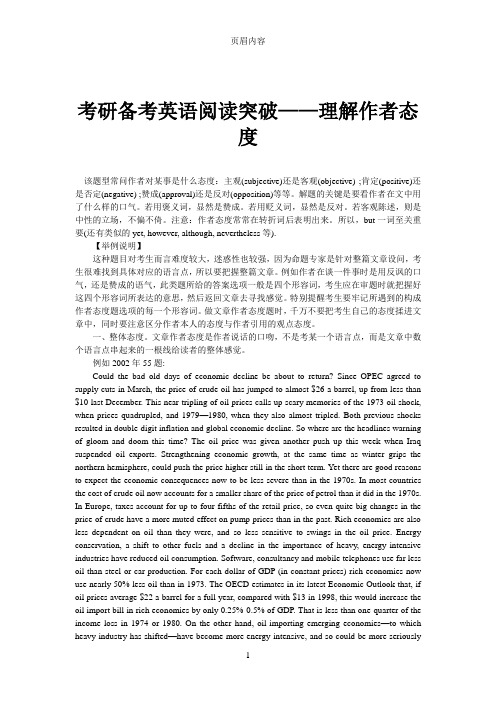
考研备考英语阅读突破——理解作者态度该题型常问作者对某事是什么态度:主观(subjective)还是客观(objective) ;肯定(positive)还是否定(negative) ;赞成(approval)还是反对(opposition)等等。
解题的关键是要看作者在文中用了什么样的口气。
若用褒义词,显然是赞成。
若用贬义词,显然是反对。
若客观陈述,则是中性的立场,不偏不倚。
注意:作者态度常常在转折词后表明出来。
所以,but一词至关重要(还有类似的yet, however, although, nevertheless等).【举例说明】这种题目对考生而言难度较大,迷惑性也较强,因为命题专家是针对整篇文章设问,考生很难找到具体对应的语言点,所以要把握整篇文章。
例如作者在谈一件事时是用反讽的口气,还是赞成的语气,此类题所给的答案选项一般是四个形容词,考生应在审题时就把握好这四个形容词所表达的意思,然后返回文章去寻找感觉。
特别提醒考生要牢记所遇到的构成作者态度题选项的每一个形容词。
做文章作者态度题时,千万不要把考生自己的态度揉进文章中,同时要注意区分作者本人的态度与作者引用的观点态度。
一、整体态度。
文章作者态度是作者说话的口吻,不是考某一个语言点,而是文章中数个语言点串起来的一根线给读者的整体感觉。
例如2002年55题:Could the bad old days of economic decline be about to return? Since OPEC agreed to supply-cuts in March, the price of crude oil has jumped to almost $26 a barrel, up from less than $10 last December. This near-tripling of oil prices calls up scary memories of the 1973 oil shock, when prices quadrupled, and 1979—1980, when they also almost tripled. Both previous shocks resulted in double-digit inflation and global economic decline. So where are the headlines warning of gloom and doom this time? The oil price was given another push up this week when Iraq suspended oil exports. Strengthening economic growth, at the same time as winter grips the northern hemisphere, could push the price higher still in the short term. Yet there are good reasons to expect the economic consequences now to be less severe than in the 1970s. In most countries the cost of crude oil now accounts for a smaller share of the price of petrol than it did in the 1970s. In Europe, taxes account for up to four-fifths of the retail price, so even quite big changes in the price of crude have a more muted effect on pump prices than in the past. Rich economies are also less dependent on oil than they were, and so less sensitive to swings in the oil price. Energy conservation, a shift to other fuels and a decline in the importance of heavy, energy-intensive industries have reduced oil consumption. Software, consultancy and mobile telephones use far less oil than steel or car production. For each dollar of GDP (in constant prices) rich economies now use nearly 50% less oil than in 1973. The OECD estimates in its latest Economic Outlook that, if oil prices average $22 a barrel for a full year, compared with $13 in 1998, this would increase the oil import bill in rich economies by only 0.25%-0.5% of GDP. That is less than one-quarter of the income loss in 1974 or 1980. On the other hand, oil-importing emerging economies—to which heavy industry has shifted—have become more energy-intensive, and so could be more seriously1squeezed. One more reason not to lose sleep over the rise in oil prices is that, unlike the rises in the 1970s, it has not occurred against the backbone of general commodity-price inflation and global excess demand. A sizable portion of the world is only just emerging from economic decline. The Economist’s commodity price index is broadly unchanging from a year ago. In 1973 commodity prices jumped by 70% and in 1979 by almost 30%.From the text we can see that the writer seems.[A] optimistic[B] sensitive[C] gloomy[D] scared本段开头用设问句引出问题,再通过严谨地分析,结合数字的对比,得出乐观的结论。
考研英语真题阅读理解试题及名师解析(17)

[A] the continuing acquisition.
[B] the growing traffic.
[C] the cheering Wall Street.
[D] the shrinking market.
they do when another railroad is competing for the business.
Shippers who feel they are being overcharged have the right to
appeal to the federal government's Surface Transportation Board for
acquire one another, with Wall Street cheering them on. Consider
the $10.2 billion bid by Norfolk Southern and CSX to acquire
Conrail this year. Conrail's net railway operating income in 1996
rate relief, but the process is expensive, time consuming, and will
work only in truly extreme cases.
Railroads justify rate discrimination against captive shippers
increase their grip on the market.
2020考研英语一真题 阅读真题及解析

Text 1A group of labour MPs, among them Yvette Cooper, are bringing in the new year with a call to institute a UK "town of culture" award. The proposal is that it should sit alongside the existing city of culture title, which was held by Hull in 2017 and has been awarded to Coventry for zozl. Cooper and her colleagues argue that the success of the crown for Hull, where it brought in E220m of investment and an avalache of arts, out not to be confined to cities. Britain' town, it is true are not prevented from applying, but they generally lack the resources to put together a bit to beat their bigger competitions. A town of culture award could, it is argued, become an annual event, attracting funding and creating jobs.Some might see the proposal as a boo by prize for the fact that Britain is no longer be able to apply for the much more prestigious title of European capital of culture, a sought-after award bagged by Glasgow in 1990 and Livorpool in 2008. A cynic might speculate that the UK is on the verge of disappearing into an endless fever of self-celebration in its desperation to reinvent itself for, the post-Brexit world: after town of culture, who knows that will follow- village of culture ? Suburb of culture? Hamlet of culture?It is also wise to recall that such titles are not a cure-all. A badly run "year of culture" washes in and out of a place like the tide, bringing prominence for a spell but leaving no lasting benefits to the community . The really successful holders of such titles are those that do a great deal more than fill hotel bedrooms and bring in high-profile arts events and good press for a year. They transform the aspirations of the people who live there; they nudge the self image of the city into a bolder and more optimistic light.It is hard to get right, and requires a remarkable degree of vision, as well as cooperation between city authorities, the private sector, community groups and cultural organizations. But it can be done : Glasgow' s year as European capital of culture can certainly be seen as one of complex series of factors that have turned the city into the power of art, music and theatre that it remains today.A "town of culture" could be not just about the arts but about honouring a town'speculiarities-helping sustain its high street, supporting local facilities and above all celebrating its people and turn it into action.21. Cooper and her colleagues argue that a "town of culture" award could________[A] consolidate the town-city ties in Britain.[B] promote cooperation among Britain's towns.[C] increase the economic strength of Britain's towns.[D] focus Britain's limited resources on cultural events.22. According to Paragraph 2, the proposal might be regarded by some as________[A] a sensible compromise.[B] a self-deceiving attempt.[C] an eye-catching bonus.[D] an inaccessible target.23. The author suggests that a title holder is successful only if it________[A] endeavours to maintain its image.[B] meets the aspirations of its people.[C] brings its local arts to prominence.D] commits to its long-term growth.24. Glasgow is mentioned in Paragraph 3 to present________[A] a contrasting case.[B] a supporting example.[C] a background story,[D] a related topic.25. What is the author's attitude towards the proposal ?[A] Skeptical[B] Objective[C] Favourable[D] Critical21 C increase the economic strength of Britain’s towns这道题是细节题。
阅读理解的解题绝技之情感态度题
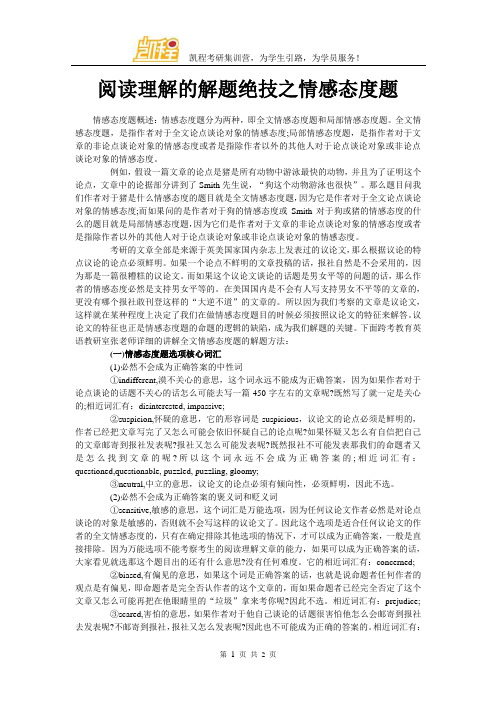
阅读理解的解题绝技之情感态度题情感态度题概述:情感态度题分为两种,即全文情感态度题和局部情感态度题。
全文情感态度题,是指作者对于全文论点谈论对象的情感态度;局部情感态度题,是指作者对于文章的非论点谈论对象的情感态度或者是指除作者以外的其他人对于论点谈论对象或非论点谈论对象的情感态度。
例如,假设一篇文章的论点是猪是所有动物中游泳最快的动物,并且为了证明这个论点,文章中的论据部分讲到了Smith先生说,“狗这个动物游泳也很快”。
那么题目问我们作者对于猪是什么情感态度的题目就是全文情感态度题,因为它是作者对于全文论点谈论对象的情感态度;而如果问的是作者对于狗的情感态度或Smith对于狗或猪的情感态度的什么的题目就是局部情感态度题,因为它们是作者对于文章的非论点谈论对象的情感态度或者是指除作者以外的其他人对于论点谈论对象或非论点谈论对象的情感态度。
考研的文章全部是来源于英美国家国内杂志上发表过的议论文,那么根据议论的特点议论的论点必须鲜明。
如果一个论点不鲜明的文章投稿的话,报社自然是不会采用的,因为那是一篇很糟糕的议论文。
而如果这个议论文谈论的话题是男女平等的问题的话,那么作者的情感态度必然是支持男女平等的。
在美国国内是不会有人写支持男女不平等的文章的,更没有哪个报社敢刊登这样的“大逆不道”的文章的。
所以因为我们考察的文章是议论文,这样就在某种程度上决定了我们在做情感态度题目的时候必须按照议论文的特征来解答。
议论文的特征也正是情感态度题的命题的逻辑的缺陷,成为我们解题的关键。
下面跨考教育英语教研室张老师详细的讲解全文情感态度题的解题方法:(一)情感态度题选项核心词汇(1)必然不会成为正确答案的中性词①indifferent,漠不关心的意思,这个词永远不能成为正确答案,因为如果作者对于论点谈论的话题不关心的话怎么可能去写一篇450字左右的文章呢?既然写了就一定是关心的;相近词汇有:disinterested, impassive;②suspicion,怀疑的意思,它的形容词是suspicious,议论文的论点必须是鲜明的,作者已经把文章写完了又怎么可能会依旧怀疑自己的论点呢?如果怀疑又怎么有自信把自己的文章邮寄到报社发表呢?报社又怎么可能发表呢?既然报社不可能发表那我们的命题者又是怎么找到文章的呢?所以这个词永远不会成为正确答案的;相近词汇有:questioned,questionable, puzzled, puzzling, gloomy;③neutral,中立的意思,议论文的论点必须有倾向性,必须鲜明,因此不选。
考研英语阅读之态度题答题技巧

考研英语阅读之态度题答题技巧考研英语阅读之态度题答题技巧在考研英语整个阅读部分的考题中,态度题年年考,年年出。
虽说这种题的题量不会很大,平均下来每年一道题左右,但如果考生希望拿到理想的阅读分数,这道态度题几乎是必须做对的。
下面店铺带着大家一起来了解一下考研英语阅读之态度题答题技巧吧!第一、问作者对某事物的态度时中,表示客观的词多为正确选项,如objective,impartial,unbiased等。
第二、既然写了文章,那么作者的态度就不会是漠不关心,因此当问及作者对文中主题词的态度时,见到indifferent,uninterested,carefree,detached这类词基本可以排除。
第三、表示偏见的词一般不选,如subjective,prejudiced,biased,partial等。
第四、表示困惑、迷茫不知所措的词不选,如confused,perplexed,puzzled,ambigus等。
第五、感情色彩深、程度深的词不选,如enthusiastic,strong,completely,radical等;反之,程度较浅的词则可入选,如preserved,qualified,tempered,guarded等。
第六、某一事物是好还是坏,作者对它是支持还是反对,只要作者写的是真正的议论文,态度一般都会比较明确,而带中立色彩的词相对来讲不容易成为正确答案,如neutral等。
第七、注意不要把我们自己的好恶态度糅进其中,不要用带有主观倾向的视角评判作者态度。
第八、作者引用别人的观点时,我们勿必分辨清楚作者引用的观点是作为支持还是反对的例证,要注意区分作者本人的态度和作者引用的观点的`态度。
第九、在做阅读题时,每位考生应该清醒地认识到我们是读者,一旦要读者对作者进行评论时,必须小心谨慎,如履薄冰,尽量不要用贬义词去表述作者态度,否则就是对作者的不敬,后果想必会比较严重。
总之,只要掌握以上原则,我们在处理态度题时会比较得法,而且正确率也会提高。
考研英语四六级阅读理解作者态度观点信号词寻找以及常见态度词汇集锦附小测试一题

常见观点态度词语小测试:positive favorable(dis)approvalsupportive defensive negativeobjection critical oppositionobjective subjective optimisticindifferent compromising uninterestedquestioning disappointed concernedneutral cautious pessimisticbiased suspicious doubtful态度观点信号词:论点:认为,相信:argue , argument , believe , suppose, think , be convinced that [相信] , hold the belief that … , have a notion that …, view…as , regard….as , see…as, consider….to be, reckon [算作,设想],论据: for example , for instance , specifically, take… as an examplelike , such as … , Imagine …. ,调查研究:investigation , inquiry [hold an inquiry into a case对一个案子进行调查]research, study, survey, report , questionnaire[调查问卷],measurement ,调查研究结果:得出结论:conclude th at … ,come to a conclusion that …. ,draw a conclusion that …表明,发现:show , suggest , demonstrate , manifest [清楚地显示或表示]display, find , find out, discover, reveal , proveindicate, imply,预测、预报、预言:forecast , foretell, foresee, predict表示赞同:agree, appreciate意识到, 懂得, approve赞成、批准, consent to同意表示反对:against , disagree, disapprove, dissent from, object to ,be opposed to反对表示事实:belief , fact , reality, truth表示理论,设想:assumption , theory, hypothesis [假设]表示目的:to do, aim at, for the sake of , for , serve as, in favor of [有利于],for the purpose of, intend to do ,论据中常见专家名称:expert , specialist , professor , associate professor [副教授],sociologist [社会学家],economist, linguist[语言学家],consultant [顾问] psychologist [心理学家],behaviorist [行为学家],philosopher[哲学家] , anthropologist [人类学家],archaeologist [考古学家]逻辑信号词-路标词1,表示因果的原因:后接句子--- Because, since , as , for后接词组--- because of , thanks to由于,多亏, owing to 由于, 因...之缘故, due to , as a result of 作为结果,by/in virtue of [由于]* The movie touched me by virtue of its story.结果:so(that), accordingly[因此];as a result; consequently; for this(that)reason; hence; therefore此外:表因果的特色词汇比如A 是因,B是果:Greenhouse effect is responsible for weather changeA account for / be responsible for BA cause / lead to / result in / bring about / bring on / trigger /give rise to B2,表示转折的“但是,然而”:but , however; yet , nevertheless, whereas“尽管,虽然”:后接句子--- although , though, even though , while ,#notwithstanding后接词组--- despite; in spite of“相反地”:conversely[相反地] ; on the contrary;“另一方面”:on the other hand;3,表示比较的by comparison ; in contrast (相比之下); in the same way; similarly4,表示递进的also; besides; furthermore; in addition; in particular(特别地)more importantly; moreover; What’s more5,表示概括的in brief; in conclusion; in short; in a word , in sum; to sum up; on the whole , to conclude6.表示并列:and , or , at the same time, meanwhile , as well as一、态度词汇总1.积极:approving 赞许的,,optimistic 乐观的, sympathetic 同情的, consent 赞成2.消极:negative否定的,消极的,反面的,pessimistic 悲观的,apprehensive 忧虑的,reserved 有保留的,内向的,arbitrary武断的, biased有偏见的,偏心的, partial 不公平的, critical 持批评态度的, depressing 令人沮丧的,disappointing令人失望的, doubtful怀疑的,object反对, be opposed to/opposing反对的, scared惊恐的,panick恐慌, sensitive敏感的,subjective主观的, suspicious怀疑的3.中性:objective 客观的,impartial 公平的, unbiased公正的4. 情绪:anger愤怒, indignant 愤怒的r, happy高兴的, contempt轻视, gloomy沮丧的5.其它:surprized惊奇的, amazed惊奇的, puzzled迷惑的, ambiguous模棱两可的, neutral 中立的,indifferent漠不关心的, subjective 主观的6.对态度的修饰词:reserved有保留的, cautiously谨慎地, enthusiatic热烈的, strong强烈的, radical激进的二、态度词分析1.可能的态度:考研阅读考的的态度有两种,一种是作者,另一是非作者的其它人。
考研英语:阅读中观点细节题和态度题的区别

考研英语:阅读中观点细节题和态度题的区别在细节题中有一种非常典型突出的类型,值得考生特别留意,即针对作者或文中人物观点本身进行提问的细节题,我们给它起名字叫做观点细节题,即在观点处出题的细节题。
这种题型概念上容易和态度题混淆,但实则两种类型题差别很大,一个是对于态度的考察,一个是对于细节的考察;另外观察选项,态度题选项多为表示态度的形容词或动词,细节题因为是对观点本身的考察,所以选项较长。
对于观点处出题的细节题,通过对历年真题的梳理和总结,另外结合实用性,总结出了一些自己的分类和方法。
下面的文章中,跨考教育英语教研室王老师将从两个方面进行探讨,首先是针对观点处出题的细节题,自己的一些方法总结;然后是对于观点处出题的细节题(即观点细节题)和态度题的区别的简要说明。
一、观点类细节题分类:通过对观点处出题的细节题的观察分析,我将观点处出题的细节题按照题干分为如下两类:a. according to the author类这种情况又可以进一步分为:1)题干中能找到文中出现频率低的词的,那么考生可以直接根据出现频率低的实词定位,回到原文当中找到题干出处,重叠选项,找出正确答案。
对于这种方法的实用性,我也做了验证,如:2001 text 4 64. ,2006 text 1 22.,2007 text 3 33.,2005 text 2 29.都可以用这种方法做出来。
2)题干中不能找到文中出现频率低的词的,从出题人的角度来讲,命题人的目的不是为了考倒大家,是为了考察大家的语言能力和逻辑思维的能力,所以出题人在命题的时候,一定是会想办法让你做出来的,对于细节题,方法主要是定位,要么你可以从选项出发定位,要么可以通过题干定位,如果题干没有给你任何信息,选项中有没办法定位,或是跟个人英语能力有关,找不到定位词的时候,这个时候就找一个最贴近主旨的选项,置于主旨的判断方法,主旨题模块介绍了很多,总有一款是适合你的。
这种情况的实用性如何呢,那我们就用真题来说明问题吧,看下下面这些年份的真题及其选项解析,你就会了解了:2008 text 333.,2004 text 3 55. ,2004 text 4 60. ,2006 text 4 38.,2003 text 2 29.。
考研英语(阅读)-试卷32

考研英语(阅读)-试卷32(总分:60.00,做题时间:90分钟)一、 Reading Comprehension(总题数:6,分数:60.00)1.Section II Reading Comprehension(分数:10.00)__________________________________________________________________________________________ 解析:2.Part ADirections: Read the following four texts. Answer the questions below each text by choosing A, B, C or D.(分数:10.00)__________________________________________________________________________________________ 解析:Come on—Everybody"s doing it. That whispered message, half invitation and half forcing, is what most of us think of when we hear the words peer pressure. It usually leads to no good—drinking, drugs and casual sex. But in her new book Join the Club, Tina Rosenberg contends that peer pressure can also be a positive force through what she calls the social cure, in which organizations and officials use the power of group dynamics to help individuals improve their lives and possibly the word. Rosenberg, the recipient of a Pulitzer Prize, offers a host of examples of the social cure in action: In South Carolina, a state-sponsored antismoking program called Rage Against the Haze sets out to make cigarettes uncool. In South Africa, an HIV-prevention initiative known as loveLife recruits young people to promote safe sex among their peers. The idea seems promising, and Rosenberg is a perceptive observer. Her critique of the lameness of many pubic-health campaigns is spot-on: they fail to mobilize peer pressure for healthy habits, and they demonstrate a seriously flawed understanding of psychology. "Dare to be different, please don"t smoke!" pleads one billboard campaign aimed at reducing smoking among teenagers—teenagers, who desire nothing more than fitting in. Rosenberg argues convincingly that public-health advocates ought to take a page from advertisers, so skilled at applying peer pressure. But on the general effectiveness of the social cure, Rosenberg is less persuasive. Join the Club is filled with too much irrelevant detail and not enough exploration of the social and biological factors that make peer pressure so powerful. The most glaring flaw of the social cure as it"s presented here is that it doesn"t work very well for very long. Rage Against the Haze failed once state funding was cut. Evidence that the loveLife program produces lasting changes is limited and mixed. There" s no doubt that our peer groups exert enormous influence on our behavior. An emerging body of research shows that positive health habits—as well as negative ones—spread through networks of friends via social communication. This is a subtle form of peer pressure: we unconsciously imitate the behavior we see every day. Far less certain, however, is how successfully experts and bureaucrats can select our peer groups and steer their activities in virtuous directions. It" s like the teacher who breaks up the troublemakers in the back row by pairing them with better-behaved classmates. The tactic never really works. And that" s the problem with a social cure engineered from the outside: in the real world, as in school, we insist on choosing our own friends.(分数:10.00)(1).According to the first paragraph, peer pressure often emerges as(分数:2.00)A.a supplement to the social cure.B.a stimulus to group dynamics.C.an obstacle to social progress.D.a cause of undesirable behaviors. √解析:解析:细节题。
考研英语阅读态度题词汇汇总
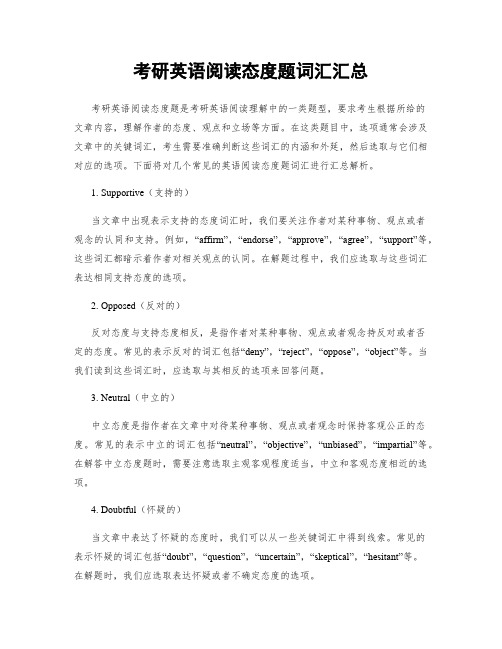
考研英语阅读态度题词汇汇总考研英语阅读态度题是考研英语阅读理解中的一类题型,要求考生根据所给的文章内容,理解作者的态度、观点和立场等方面。
在这类题目中,选项通常会涉及文章中的关键词汇,考生需要准确判断这些词汇的内涵和外延,然后选取与它们相对应的选项。
下面将对几个常见的英语阅读态度题词汇进行汇总解析。
1. Supportive(支持的)当文章中出现表示支持的态度词汇时,我们要关注作者对某种事物、观点或者观念的认同和支持。
例如,“affirm”,“endorse”,“approve”,“agree”,“support”等,这些词汇都暗示着作者对相关观点的认同。
在解题过程中,我们应选取与这些词汇表达相同支持态度的选项。
2. Opposed(反对的)反对态度与支持态度相反,是指作者对某种事物、观点或者观念持反对或者否定的态度。
常见的表示反对的词汇包括“deny”,“reject”,“oppose”,“object”等。
当我们读到这些词汇时,应选取与其相反的选项来回答问题。
3. Neutral(中立的)中立态度是指作者在文章中对待某种事物、观点或者观念时保持客观公正的态度。
常见的表示中立的词汇包括“neutral”,“objective”,“unbiased”,“impartial”等。
在解答中立态度题时,需要注意选取主观客观程度适当,中立和客观态度相近的选项。
4. Doubtful(怀疑的)当文章中表达了怀疑的态度时,我们可以从一些关键词汇中得到线索。
常见的表示怀疑的词汇包括“doubt”,“question”,“uncertain”,“skeptical”,“hesitant”等。
在解题时,我们应选取表达怀疑或者不确定态度的选项。
5. Optimistic(乐观的)/Pessimistic(悲观的)当文章中表达了对于某种事物、观点或者观念的乐观或者悲观态度时,我们需要从相关词汇中寻找线索。
常见的表示乐观态度的词汇有“optimistic”,“hopeful”,“positive”等;表示悲观态度的词汇有“pessimistic”,“negative”,“doubtful”等。
考研英语阅读理解观点态度题解析
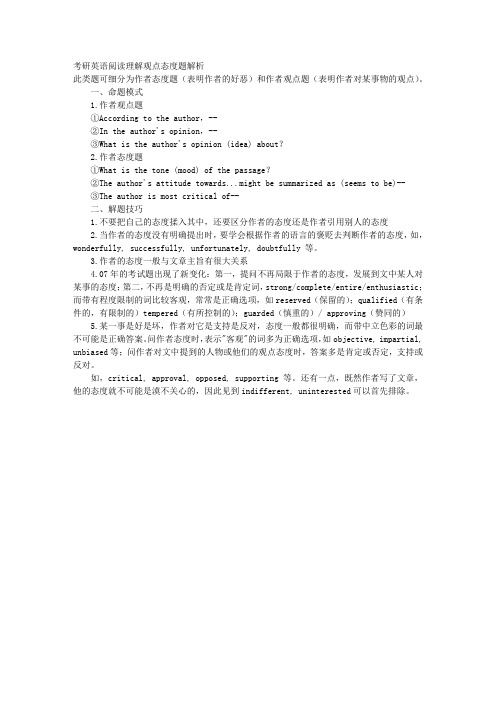
考研英语阅读理解观点态度题解析此类题可细分为作者态度题(表明作者的好恶)和作者观点题(表明作者对某事物的观点)。
一、命题模式1.作者观点题①According to the author,--②In the author's opinion,--③What is the author's opinion (idea) about?2.作者态度题①What is the tone (mood) of the passage?②The author's attitude towards...might be summarized as (seems to be)--③The author is most critical of--二、解题技巧1.不要把自己的态度揉入其中,还要区分作者的态度还是作者引用别人的态度2.当作者的态度没有明确提出时,要学会根据作者的语言的褒贬去判断作者的态度,如,wonderfully, successfully, unfortunately, doubtfully 等。
3.作者的态度一般与文章主旨有很大关系4.07年的考试题出现了新变化:第一,提问不再局限于作者的态度,发展到文中某人对某事的态度;第二,不再是明确的否定或是肯定词,strong/complete/entire/enthusiastic;而带有程度限制的词比较客观,常常是正确选项,如reserved(保留的);qualified(有条件的,有限制的)tempered(有所控制的);guarded(慎重的)/ approving(赞同的)5.某一事是好是坏,作者对它是支持是反对,态度一般都很明确,而带中立色彩的词最不可能是正确答案。
问作者态度时,表示"客观"的词多为正确选项,如objective, impartial, unbiased等;问作者对文中提到的人物或他们的观点态度时,答案多是肯定或否定,支持或反对。
轻松应对考研英语阅读理解态度题合集1篇
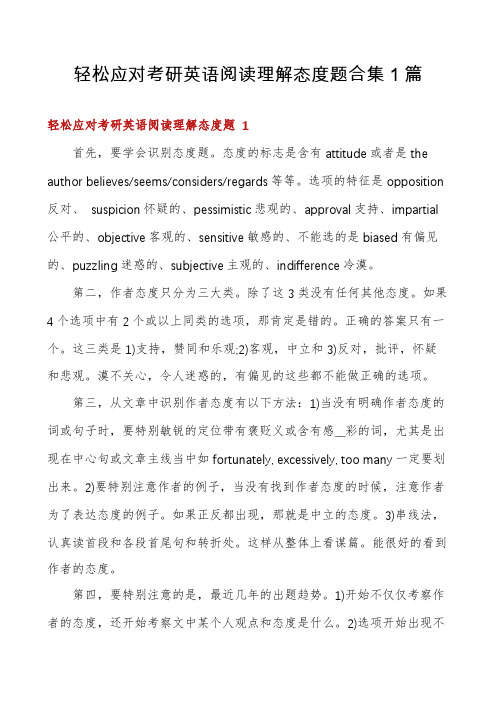
轻松应对考研英语阅读理解态度题合集1篇轻松应对考研英语阅读理解态度题 1首先,要学会识别态度题。
态度的标志是含有attitude或者是the author believes/seems/considers/regards等等。
选项的特征是opposition 反对、suspicion怀疑的、pessimistic悲观的、approval支持、impartial 公平的、objective客观的、sensitive敏感的、不能选的是biased有偏见的、puzzling迷惑的、subjective主观的、indifference冷漠。
第二,作者态度只分为三大类。
除了这3类没有任何其他态度。
如果4个选项中有2个或以上同类的选项,那肯定是错的。
正确的答案只有一个。
这三类是1)支持,赞同和乐观;2)客观,中立和3)反对,批评,怀疑和悲观。
漠不关心,令人迷惑的,有偏见的这些都不能做正确的选项。
第三,从文章中识别作者态度有以下方法:1)当没有明确作者态度的词或句子时,要特别敏锐的定位带有褒贬义或含有感__彩的词,尤其是出现在中心句或文章主线当中如fortunately, excessively, too many一定要划出来。
2)要特别注意作者的例子,当没有找到作者态度的时候,注意作者为了表达态度的例子。
如果正反都出现,那就是中立的态度。
3)串线法,认真读首段和各段首尾句和转折处。
这样从整体上看谋篇。
能很好的看到作者的态度。
第四,要特别注意的是,最近几年的出题趋势。
1)开始不仅仅考察作者的态度,还开始考察文中某个人观点和态度是什么。
2)选项开始出现不再是态度明确的肯定或否定的`词,而改为带有程度限制的词语。
比如reserved(有保留的),tempered(温和的,缓和的)因为持有保留态度的观点比较客观。
3)一般带有绝对化或过于强烈的词修饰的选项一定是错的。
此外,就历年真题而言,大家可以参考英语(一)1998年62题,1999年54题,2002年55题,2003年58题,2004年52,55题来一起练习下这个做题技巧。
干货:2021考研英语阅读理解十大题型解析:文章态度(观点)题

干货:2021考研英语阅读理解十大题型解
析:文章态度(观点)题
摘要:考研英语阅读理解常见的题型可以分为十大类,以下是针对这十大类题型,为大家做出的解析,各位同学在复习备考的过程中,可以根据这些题型,摸索出属于自己的解题策略,以期在考场上如鱼得水。
(六)文章态度(观点)题
1. 题型特点
问文中某人对某事物的态度。
作为作者态度题的一种新形式,命题也开始注重考查文章中某人对某事的观点和态度。
2. 标志和关键词
题干中常有attitude,opinion,tone等。
选项可能不再是态度明确的肯定或否定的词,而改为带有程度限制的词语。
比如guarded(慎重的),qualified(有条件的,有限制的),reserved(有保留的),tempered(温和的,缓和的)。
3. 命题模式
(1)What is the tone(mood)of ?(2)What is opinion about?
4. 做题关键
要注意区分作者的态度与其他人的态度。
因为持有保留态度的观点比较客观,往往是正确答案。
文章陈述的内容并非都是作者的观点,要注意区分,这是命题最具有迷惑性的地方。
因此,作者引用别人的观点时,是作为支持或抨击的对象,别人的观点通常是为了证明作者的论据来给出的。
5. 注意事项
这类试题与作者态度题不同,作者观点一般与文章主旨相关联,而文章某人的观点则不一定紧密相关。
一般带有绝对化或过于强烈的词修饰的选项必错。
比如:strongly,completely,entirely,enthusiasticly等。
2010考研英语真题阅读理解试题及名师解析(17)
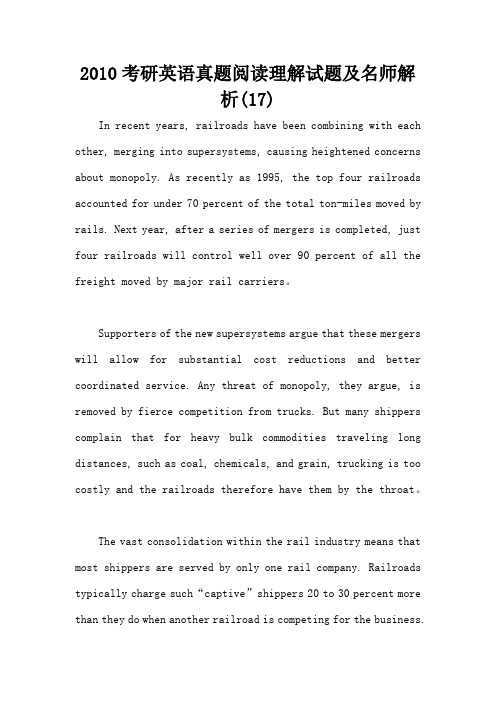
2010考研英语真题阅读理解试题及名师解析(17)In recent years, railroads have been combining with each other, merging into supersystems, causing heightened concerns about monopoly. As recently as 1995, the top four railroads accounted for under 70 percent of the total ton-miles moved by rails. Next year, after a series of mergers is completed, just four railroads will control well over 90 percent of all the freight moved by major rail carriers。
Supporters of the new supersystems argue that these mergers will allow for substantial cost reductions and better coordinated service. Any threat of monopoly, they argue, is removed by fierce competition from trucks. But many shippers complain that for heavy bulk commodities traveling long distances, such as coal, chemicals, and grain, trucking is too costly and the railroads therefore have them by the throat。
2023年考研英语阅读态度题选项归纳

一.情感态度题旳词语选项一般可以分为如下几种:1.褒义词impartial,(公正旳), rewarding(有回报旳), appreciative (欣赏旳),positive (肯定旳, 积极旳), optimistic (乐观旳), useful (有用旳, 有益旳), admiring (赞赏旳, 钦佩旳), interesting (有趣旳), instructive (有益旳, 教育性旳), enthusiastic (热心旳, 热情旳), supportive (支持旳), support(支持), approval (赞成, 承认), approving (满意旳), confident (自信旳, 确信旳), impressed (留下印象旳), reverent (尊敬旳), polite (有礼貌旳, 文雅旳)。
2.贬义词Apprehensive(担忧旳), hostile (敌对旳), dubious(怀疑旳),intolerant (不能容忍旳), negative (否认旳, 消极旳), pessimistic (消极旳, 厌世旳), subjective (主观旳, 个人旳), disappointed (失望旳), frustrated (失败旳, 落空旳), critical (批评旳), questioning (质疑旳), doubtful (可疑旳, 不确旳), compromising (妥协旳), dissatisfied (不满意旳, 不快乐旳), biased (有偏见旳), satirical (挖苦旳), puzzling (困惑旳), suspicious (怀疑旳), gloomy (令人沮丧旳), scared (恐惊旳), cynical (愤世嫉俗旳), oppose (反对), opposition (反对), disgust (令人反感), disgusting (令人厌恶旳), worried (闷闷不乐旳), depressed (沮丧旳), contemptuous (轻蔑旳, 欺侮旳), arbitrary/opinionated (武断旳) 。
考研《英语二》答案:阅读理解

考研《英语二》答案:阅读理解Part AText 121、【答案】B A special tour【解析】细节题。
答案定位在第二段的“it is far better to spend money on experiences…like interesting trips…”,意思是“花钱消费在经历方面更好……,比如说有趣的旅行……”,由此可以得知答案是B选项“一场特别的旅行”。
22、【答案】A critical【解析】观点态度题。
答案定位在第三段的“so mething the average American spends a whopping two months a year doing, and is hardly jollier for it”,意思是“普通美国人一年花两个月的时间看电视,并且看电视几乎不可能更愉快”,因此可以得知作者对于看电视的态度是A选项“批判的”。
23、【答案】D rarity generally increases pleasure【解析】观点例证题。
答案定位在第三段,文章中提到Mc Rib这个例子,用这个例子证明的论点是“luxuries are most enjoyable when they are consumed sparingly”,大意是“有节制地消费奢侈品最令人愉悦”,D选项正是这句论点句的同义替换。
24、【答案】B may prove to be a worthwhile purchase【解析】细节题。
答案定位在最后一段的最后一句“most people will come away from this book believing it was money well spent”,大意是“大多数人看完这本书后,认为物有所值”,因此可以推知B选项是正确答案。
25、【答案】A balance feeling good and spending money【解析】主旨题。
考研英语(阅读)-试卷30

考研英语(阅读)-试卷30(总分:60.00,做题时间:90分钟)一、 Reading Comprehension(总题数:6,分数:60.00)1.Section II Reading Comprehension(分数:10.00)__________________________________________________________________________________________ 解析:2.Part ADirections: Read the following four texts. Answer the questions below each text by choosing A, B, C or D.(分数:10.00)__________________________________________________________________________________________ 解析:Come on—Everybody" s doing it. That whispered message, half invitation and half forcing, is what most of us think of when we hear the words peer pressure. It usually leads to no good—drinking, drugs and casual sex. But in her new book Join the Club, Tina Rosenberg contends that peer pressure can also be a positive force through what she calls the social cure, in which organizations and officials use the power of group dynamics to help individuals improve their lives and possibly the word. Rosenberg, the recipient of a Pulitzer Prize, offers a host of examples of the social cure in action: In South Carolina, a state-sponsored antismoking program called Rage Against the Haze sets out to make cigarettes uncool. In South Africa, an HIV-prevention initiative known as loveLife recruits young people to promote safe sex among their peers. The idea seems promising, and Rosenberg is a perceptive observer. Her critique of the lameness of many pubic-health campaigns is spot-on: they fail to mobilize peer pressure for healthy habits, and they demonstrate a seriously flawed understanding of psychology. "Dare to be different, please don"t smoke!" pleads one billboard campaign aimed at reducing smoking among teenagers—teenagers, who desire nothing more than fitting in. Rosenberg argues convincingly that public-health advocates ought to take a page from advertisers, so skilled at applying peer pressure.But on the general effectiveness of the social cure, Rosenberg is less persuasive. Join the Club is filled with too much irrelevant detail and not enough exploration of the social and biological factors that make peer pressure so powerful. The most glaring flaw of the social cure as it"s presented here is that it doesn"t work very well for very long. Rage Against the Haze failed once state funding was cut. Evidence that the loveLife program produces lasting changes is limited and mixed. There" s no doubt that our peer groups exert enormous influence on our behavior. An emerging body of research shows that positive health habits—as well as negative ones—spread through networks of friends via social communication. This is a subtle form of peer pressure: we unconsciously imitate the behavior we see every day. Far less certain, however, is how successfully experts and bureaucrats can select our peer groups and steer their activities in virtuous directions. It"s like the teacher who breaks up the troublemakers in the back row by pairing them with better-behaved classmates. The tactic never really works. And that"s the problem with a social cure engineered from the outside: in the real world, as in school, we insist on choosing our own friends.(分数:10.00)(1).According to the first paragraph, peer pressure often emerges as(分数:2.00)A.a supplement to the social cure.B.a stimulus to group dynamics.C.an obstacle to social progress.D.a cause of undesirable behaviors. √解析:解析:细节题。
考研英语真题阅读理解试题及名师解析(十八)

It is said that in England death is pressing, in Canada inevitable and in California optional .Small wonder. Americans’ life expectancy has nearly doubled over the past century. Failing hips can be replaced, clinical depression controlled, cataracts removed in a 30-minute surgical procedure. Such advances offer the aging population a quality of life that was unimaginable when I entered medicine 50 years ago. But not even a great health-care system can cure death—and our failure to confront that reality now threatens this greatness of ours。
Death is normal; we are genetically programmed to disintegrate and perish, even under ideal conditions. We all understand that at some level, yet as medical consumers we treat death as a problem to be solved. Shielded by third-party payers from the cost of our care, we demand everything that can possibly be done for us, even if it's useless. The most obvious example is late-stage cancer care. Physicians—frustrated by their inability to cure the disease and fearing loss of hope in the patient—too often offer aggressive treatment far beyond what is scientifically justified。
考研英语阅读理解题型之作者态度分析

考研英语阅读理解题型之作者态度分析考研英语阅读理解题型之作者态度分析在考研英语阅读理解题型中,作者态度题每年都会涉及,题量不会很大,基本每次一题。
能否正确把握作者态度对于文章的整体理解是至关重要的。
1. 标志:attitude2. 作者的态度只分为三种:支持或赞同;中立或客观;怀疑、批评或反对3. 判定作者态度的方法A) 寻找带有作者强烈感情色彩的名词、动词、形容词或者副词来判定作者态度。
如2009年大纲样题(1996年真题)“The growth of the limited liability company and municipal business had important consequences. Such large, impersonal manipulation of capital and industry greatly increased the numbers and importance of shareholders as a class, an element in national life representing irresponsible (不负责任的,明显是一个贬义词,作者就是批判股东的)wealth detached from the land and the duties of the landowners; and almost equally detached from the responsible management of business.” “Fortunately, (幸运的,明显后面连接的是作者支持的',即行业公会起了一个好的作用)however, the increasing power and organisation of the trade unions, at least in all skilled trades, enabled the workmen to meet on equal terms the managers of the companies who employed them.”61. According of the passage, all of the following are true except that ________.[A] the shareholders were unaware of the needs of the workers[B] the old firm owners had a better understanding of their workers[C] the limited liability companies were too large to run smoothly[D] the trade unions seemed to play a positive role (行业公会扮演了一个积极的角色)62. The author is most critical of ________.[A] family firm owners[B] landowners[C] managers[D] shareholders (批判股东)B) 段首句中含有“but, yet, however, in fact”类表示强转折关系的词时,这句话通常表征作者观点。
考研阅读理解态度题

阅读理解态度题瞬间秒杀技巧在阅读理解的作者态度题中:/如果选项表述的态度过于强烈或过于负面,比如悲观(pessimistic/gloomy)、恐惧(scared)、蔑视/嘲笑(contempt/scornful/disdainful)、绝望(desperate)、有害(harmful/destructive)、自以为是(conceited)、讽刺(sarcastic)等,不是答案。
/如果选项表述困惑(confused/puzzled)、漠不关心(indifference/indifferent)、不确定(uncertain/ambiguous)、犹豫(hesitancy)等,不是答案。
因为作者必须表明一个明确的态度,不能模棱两可。
/如果选项表述偏见(biased),不是答案。
/如果选项表述容忍(tolerant/tolerance/permissive/indulgence),不是答案。
/如果选项表述支持(supportive)、欣赏(appreciation/appreciative)、满意(satisfaction/desirable)、肯定(positive)等,通常不是答案。
/如果选项表述怀疑(suspicion/skeptical/doubtful/questionable)、乐观(optimistic)、同情(sympathy)、客观(objective/impartial)、赞同(approval/consent)等,通常是答案。
(注:此处“怀疑”是针对全文中局部内容的怀疑,如果是针对全文的怀疑,则不是答案)第一/1.客观理性原则某一事物是好是坏,作者对它是支持、反对还是中立,态度一般都非常明确。
问作者对某事物的态度时,表示“客观”的词多为正确选项(事物是客观存在的)。
如objective,impartial,unbiased等。
问作者对其提到的某人的观点的态度时,答案只能是肯定或否定,支持或反对。
考研英语阅读态度题方法讲解.doc

考研英语阅读态度题方法讲解考研英语阅读是整体试卷分数最重的局部,历年都是兵家必争之地,也是让很多考生很“忧愁”的题型之一。
下面是为大家带来的考研英语阅读态度题方法讲解,欢送阅读。
通过对考研英语阅读文章题干的观察分类态度题题干特点如下,当题干中出现attitude,the author...,the writer (i)the author’s opinion,feel about等,即可判断该题干为态度题,见历年真题题干如下:1.In the author’s opinion, the absorption of immigrants into American society is .(xx Text 1)2.From the text we can conclude that the author .(xx Text 2)3.What is the author’s attitude towards IQ test? (xx text 2)xx Text 4 66.xx Text 3 55.xx Text 1 25.xx Text 2 30.xx Text 2 30.*以xx Text 2 30题为例进展分析*:What is the author’s attitude towards IQ test? (xx text 2)(文章中以莎凡的例子引出文章论述要点,即智力测验不能够说明人的智力上下——二段1句,在起承转合的合的最后一段,作者指出了智力测验的弊端,不能评估创造力和实践能力,压力下不能评估领导能力,通过串线法把握文章脉络,可见作者是持疑心态度的。
)[A] Supportive. 反向干扰[B] Skeptical.[C] Impartial. 作者侧重讨论缺乏之处,不是中立的态度,中立态度一般放在文中既讨论有利之处又讨论弊端的文章中[D] Biased. 文中质疑智力测验有理有据,所以并不能够说是偏见。
- 1、下载文档前请自行甄别文档内容的完整性,平台不提供额外的编辑、内容补充、找答案等附加服务。
- 2、"仅部分预览"的文档,不可在线预览部分如存在完整性等问题,可反馈申请退款(可完整预览的文档不适用该条件!)。
- 3、如文档侵犯您的权益,请联系客服反馈,我们会尽快为您处理(人工客服工作时间:9:00-18:30)。
阅读理解态度题瞬间秒杀技巧在阅读理解的作者态度题中:/如果选项表述的态度过于强烈或过于负面,比如悲观(pessimistic/gloomy)、恐惧(scared)、蔑视/嘲笑(contempt/scornful/disdainful)、绝望(desperate)、有害(harmful/destructive)、自以为是(conceited)、讽刺(sarcastic)等,不是答案。
/如果选项表述困惑(confused/puzzled)、漠不关心(indifference/indifferent)、不确定(uncertain/ambiguous)、犹豫(hesitancy)等,不是答案。
因为作者必须表明一个明确的态度,不能模棱两可。
/如果选项表述偏见(biased),不是答案。
/如果选项表述容忍(tolerant/tolerance/permissive/indulgence),不是答案。
/如果选项表述支持(supportive)、欣赏(appreciation/appreciative)、满意(satisfaction/desirable)、肯定(positive)等,通常不是答案。
/如果选项表述怀疑(suspicion/skeptical/doubtful/questionable)、乐观(optimistic)、同情(sympathy)、客观(objective/impartial)、赞同(approval/consent)等,通常是答案。
(注:此处“怀疑”是针对全文中局部内容的怀疑,如果是针对全文的怀疑,则不是答案)第一/1.客观理性原则某一事物是好是坏,作者对它是支持、反对还是中立,态度一般都非常明确。
问作者对某事物的态度时,表示“客观”的词多为正确选项(事物是客观存在的)。
如objective,impartial,unbiased等。
问作者对其提到的某人的观点的态度时,答案只能是肯定或否定,支持或反对。
如critical,approval,opposition等。
另外,考试所选文章通常是理性的说明和论证,具有较强的逻辑性,作者对于所讨论话题的态度不会是偏激的。
/2.关注责任原则既然写了文章,那么作者的态度就不可能漠不关心,因此见到indifferent,uninterested这类词可以首先排除。
一般带有绝对化或表示过于强烈的态度的词必错,如strong,complete,entire,enthusiastic等。
而有所保留的态度比较客观,因此常常是正确选项,如reserved(保留的),qualified(有限制的,有条件的)等。
/3.主旨相关原则作者观点一般与文章主旨相关联。
尤其注意文章首末端和倒数第二段,特别是末段,往往是答案所在。
第二/第1步:看选项,首先排除不可能成为最佳选项的单词(往往含有人身攻击性的词汇,态度过于强烈或过于负面),例如:contempt/contemptuous/scornful/disdainful(轻蔑,蔑视,嘲笑)sarcastic/cynical(讽刺的,挖苦的)gloomy(沮丧的) disappointment(失望,沮丧)desperate(绝望的)scared(恐惧的,害怕的)compromising(妥协的)tolerant(容忍的)fruitless(徒劳的)arbitrary/subjective(主观臆断的)harmful/destructive(有害的) disgusting(讨厌的)hostile(敌对的)sensitive(敏感的):这个词汇是万能选项,因为任何议论文作者必然是对论点谈论的对象是敏感的,否则就不会写这样的议论文了。
因此这个选项是适合任何议论文的作者的全文情感态度的,只有在确定排除其他选项的情况下,才可以成为正确答案,一般是直接排除。
因为万能选项不能考察考生的阅读理解文章的能力,如果可以成为正确答案的话,大家看见就选那这个题目出的还有什么意思?没有任何难度。
它的相近词汇有:concerned。
negative/passive(消极的)pessimistic/gloomy(悲观的) condemnable(该罚的,该受责备的)unforgiving(不可饶恕的,不可原谅的) /第2步:看选项,排除永陪选项,例如:biased/prejudice(有偏见的)puzzling/puzzled/confused(困惑的):作者花费了很多精力针对这个话题来进行调查研究,并且根据清晰的逻辑将调查结果写成文章,那么作者一定对这个话题非常了解,不会存疑。
indifferent(indifference)/disinterested/uninterested/impassive(漠不关心的):如果作者对于谈论的话题不关心的话怎么可能去写一篇450字左右的文章呢?既然写了就一定是关心的。
uncertain/ambiguous(不确定的,模糊的)hesitancy(犹豫) conceited/self-righteous(自以为是的)neutral(中立的):论点必须有倾向性,必须鲜明,而该词没有任何倾向性,因此不选。
/第3步:看选项,排除选项中的相同/相近选项(相同/相近的态度一般是错误选项)通常情况下,若两个(或三个)选项表示同一种态度,即同为正面态度或负面态度,那么这两个(或三个)选项一般是错误项。
例如某题选项如下:[A].identical(一致的)[B].similar(相似的)[C].complementary(相互补充的)[D].opposite(相反的)这道题中,ABC是相近选项,故排除ABC,答案选D。
/第4步:如果无法排除,到原文中找表示作者感情色彩的形容词、副词、中心思想句以及举例的方式/第5步:看选项,保留选项中可以成为正确答案的词,答案往往产生于下列选项中(注:态度都有一定的倾向性):suspicious(suspicion)/skeptical/doubtful/questionable/questioned(怀疑的)(如果是针对全文中局部内容的怀疑,通常是答案;如果是针对全文的怀疑,通常不是答案) optimistic(乐观的)(是答案的可能性较大)sympathy(同情的)(是答案的可能性较大)opposition(反对)critical(批评)approval(赞成)supportive(支持的)(是答案的可能性较小) objective/impartial(客观的):不同于neutral,该词有褒义倾向,是具有褒义色彩的中性词,可以成为答案。
positive(积极的,肯定的)(是答案的可能性较小)satisfaction(满意)(是答案的可能性较小)appreciation(appreciative)(欣赏)(是答案的可能性较小)apprehensive(担忧的)surprised/amazed(惊讶的)/第6步:看题干,判断情感态度指向的对象。
(微信号:kaoyanx)/第7步:判断该对象的性质:如果该对象与伦理道德观念相吻合,那么应该选择含有可以成为正确答案的褒义词的选项,比如尊师重道。
如果该对象与伦理道德观念不相吻合,那么应该选择含有可以成为正确答案的贬义词的选项,比如作奸犯科。
如果该对象与伦理道德观念没有关系,那么应该选择可以成为正确答案的具有褒义色彩的中性词,比如经济的增长或衰弱。
如果该对象与伦理道德的的关系还没有形成定论,那么应该选择可以成为正确答案的具有褒义色彩的中性词,比如安乐死,我们的道德观念不认为一个人支持安乐死就说他是邪恶的,也不会认为一个人反对安乐死就说他是残忍的,我们的道德观念是允许发表任何言论。
注#1:如果判断一个题目应该选择褒义词,但是选项中没有褒义词的时候应该选择具有褒义色彩的中性词;反之亦然。
注#2:可以成为正确答案的具有褒义色彩的中性词成为正确答案的机率最大,其次是可以成为正确答案的褒义词,最后是可以成为正确答案的贬义词。
第三The author's attitude toward choosing Mauna Kea as the TMT site is one of [A].severe criticism(严厉批评)[B].passive acceptance(被动接受)[C].slight hesitancy(略显犹豫)[D].full approval(完全支持)[解析]:根据解题原则1(客观理性原则),或参考上面的第2步,优先排除C。
再看ABD三个选项,AB都是负面态度,参考上面的第3步,应排除AB。
所以答案选D(微信号:kaoyanx)。
/例2:2014年英语(一)第35题The author believes that the new awards are[A].acceptable despite the criticism(尽管存在批评,还是能接受的)[B].harmful to the culture of research(对于有关研究的文化有害)[C].subject to undesirable changes(遭受不好的变化)[D].unworthy of public attention(不值得公众的关注)[解析]:题干中“believes”说明该题是态度题。
(1)该题是问对事物的态度,根据解题原则1(客观理性原则),选项A表述最为客观(含关键词“despite”),而且是带有褒义色彩的客观,所以答案选A。
(2)参考上面的第1步,B中“harmful”表述过于负面,最不可能是答案,所以优先排除B。
再看ACD三个选项,C中“undesirable”和D中“unworthy”都是负面态度,参考上面的第3步,应排除CD。
所以答案选A。
According to Paragraph1,what is the author's attitude toward the AAAS's report? [A].Critical(批评的)[B].Appreciative(欣赏的)[C].Contemptuous(鄙视的)[D].Tolerant(容忍的)[解析]:参考上面的第1步,“Contemptuous”和“Tolerant”最不可能是答案,优先排除CD。
参考上面的第5步,“Appreciative”是答案的可能性较小,排除B,所以可推断答案为A。
可结合文章做进一步的验证。
/例4:2011年英语(一)第25题Regarding Gilbert's role in revitalizing the Philharmonic,theauthor feels[A].doubtful(怀疑的)[B].enthusiastic(充满热情的)[C].confident(有信心的)[D].puzzled(困惑的)[解析]:根据解题原则1(客观理性原则),或参考上面的第2步,优先排除D。
